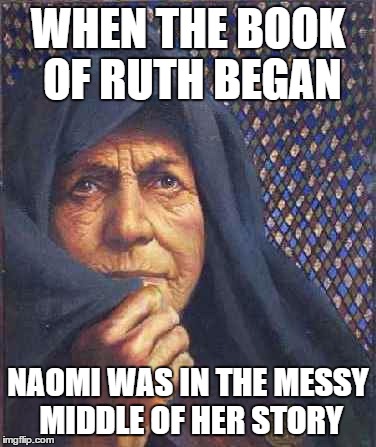At the beginning of the book of Ruth, Naomi was bitter. No doubt about it. She said she was bitter. She changed her name to “Bitter.” (That’s what “Mara” means.) Preachers and writers often point to her as an example of sinful bitterness.
When many preachers and writers talk about Naomi they say that she—and you—should instead be like Joseph in Genesis 50. After he was betrayed by his brothers, he said (verse 20), “You meant it for evil, but God meant it for good.”
But there are a couple of problems with this way of thinking. For one thing, when we look at the word bitter elsewhere in the Bible, we can see that the majority of the time, it’s talking about grief. Naomi was grieving. (Untwisting Scriptures talks about what grief really is and how a lot of people don’t understand it and don’t want to acknowledge it.)
And there’s another important point we should observe about Naomi in contrast to Joseph.
When Joseph said those words filled with faith, he was at the end of his story.
At the end of his story, Joseph could look back over his life and see how God had worked even in the midst of evil events. But in the messy middle of his story, he experienced the bitterness of betrayal by family members, fetters on his feet and a collar of iron around his neck (Psalm 105), the bitterness of a false accusation, and then years of unjust imprisonment.
When the book of Ruth started, Naomi was in the messy middle of her story.
She had just lost three family members. She couldn’t even see through the dark cloud of grief.
Naomi felt as if she had no hope or future. But her story didn’t end there.
Here’s a direct quote from Untwisting Scriptures that were used to tie you up, gag you, and tangle your mind:
In the middle of Naomi’s story, Ruth came as an unlikely heroine to walk beside her and help her hold out hope for something better than the bitter experiences Naomi had endured. By the time she came to the end of her life, Naomi was able to see true redemption come to her family, in the most unlikely of ways.
Naomi couldn’t have predicted that the son of Ruth and Boaz she held in her arms would one day be the grandfather of David, the greatest king of Israel, and an ancestor of Jesus Himself. She couldn’t have predicted that her son-in-law Boaz would one day be seen as a type of Christ. She couldn’t possibly have known how far, far greater the plan of God was than the perspective she was able to have.
But I do think that at the end of her life, she, like Joseph, could look back over the whole story, the love story of Ruth and Boaz, and see how God had held her, even through evil events, right to where she was at that point. Like Joseph, she could say, “God meant it for good.”
When someone is grieving and struggling, far too many people (one is too many!) jump to the conclusion “You’re bitter” without understanding what Biblical bitterness is, and then rebuke them for sin.
Instead, let’s recognize that they’re in the messy middle of their story and walk with them through it, the way Ruth did for Naomi. Let’s trust that even in the pain, the Lord has better things ahead for us.
The days of this bitterness will pass. This story is not over.
***
Read more in Untwisting Scriptures that were used to tie you up, gag you, and tangle your mind.
***
Go here to download your free Guide, How to Enjoy the Bible Again (when you’re ready) After Spiritual Abuse (without feeling guilty or getting triggered out of your mind). You’ll receive access to both print and audio versions of the Guide (audio read by me). I’m praying it will be helpful.



I am going through a divorce from an emotionally abusive, serial philanderer. Generally, I have had very understanding people comfort and counsel me. But my son has been surrounded by men who keep telling him that he must forgive and stop being bitter (they began these admonishments just a few weeks after his dad left). That his depression over this is bitterness and it will rot him. I am going to get this book to read with him. I have been telling him that he is allowed to be depressed and even angry as he heals. This may help him very much.
Hi Steph, and thank you for your comment. I get what you’re talking about, having worked on the book Unholy Charade: Unmasking the Domestic Abuser in the Church. After something terrible happens (and that’s what you’ve described), people who ultimately trust in Jesus should still be allowed to work through their pain without being forced to shut down their emotions. There are healthy ways to work through painful emotions, but shutting them down isn’t healthy and isn’t Christian. Prayers for you and your son!
Hi Steph,
I grieve for you and your son. It is an intensely painful journey – betrayed by one who was supposed to love and protect. I’m so sorry for all that you are both experiencing. 🙁
I have my own struggles and am hesitant to offer words of encouragement when I am still trying to understand who God is and what is true. While I feel grief for you and your son, I don’t know enough to really offer hope – what I WISH I could do.
My own experiences in life’s journey are different from the path that you and your son are experiencing and I can’t pretend to understand how deep the wound must be when inflicted by your husband. I CAN, however, identify with your son in the sense that I also experienced a father who seemingly didn’t or couldn’t love his kids. I can’t compare the situations. They are different, however, I went through years of hearing the advice that it seems your son is hearing and from my own perspective, those words were much more destructive than my father’s actions. I don’t know how to put things into words easily, but from my own perspective, when the one who is supposed to love and protect us the most betrays us, it is crushing. Somewhere along that journey, I think we all look for answers, have doubts, questions, etc. Hearing condemnation from “Christians” when they see our grief, is sort of a breaking, shattering thing. When I hear it, I feel like large boulders are being piled on my broken body and crippled body and I am being told to stand up and walk if I want to please “God.”
I’m in the middle of my journey, so am hesitant to speak as if I somehow know the answers. I don’t. However, is it okay to share something with you that I have found comforting?
I have always hated the book of Job in the Bible. I knew only the pieces that were taken from it to heap more condemnation on someone who is already suffering. One day, I read it myself in an easier to read translation. I read it sure that I would see Job crushed by his experiences, crushed by the advice of his friends and sort of crushed again by God’s response to him. What I actually read, however, was shocking. His friends started out well. They sat silently and grieved with him without speaking. I was impressed. Later, when they spoke to him, their words sounded kinder than the words I usually hear heaped on broken people. While I felt pain for Job in hearing them, I also thought they were perhaps correct in what they were saying to him. I was shocked at the end of the book when God strongly rebuked Job’s friend / advice givers!!
I am pretty sure that in every sermon I have heard about Job, Job was criticized for reacting with such intense grief and questioning. His friends were portrayed as godly and as giving wise advice, but at the end of the book, God says that he was ANGRY at the friends and that THEY needed forgiveness for their wrong towards Job.
I can’t pretend to understand it all. I truly don’t understand it. I do, however, understand that Job reacted in grief. His friends heaped advice and judgement on him, but God wasn’t seemingly pleased by their actions!
Thank you both for your comments. I am so thankful for the resources I have been finding within the Christian community to help myself and my children.
This excerpt is one I needed to read today. The entire book is very helpful, but since I’m in a “messy middle” right now, caring for a child with mental health issues, I need to be frequently reminded that God has a much bigger plan than I can see. While I’m grateful he is powerful enough to work everything out for good, I’m mostly just weary with the messy, demanding “dealing” with tough dynamics.
Rebecca, you’re a blogger/author who has become a long distance friend to my heart. My weary soul is grateful for your loving words of truth.
Thank you for your words of encouragement, Wendy. As you know from the book, even while I was working on that chapter, I was clobbered with several things that caused me great grief, and so was reminded of my own “messy middle.” I know our Shepherd is good and trustworthy, but I also know we need to acknowledge the necessity of grieving as part of the human condition. There is joy on the other side of the valleys, but there are valleys.
I absolutely love this! Yes, I heard it quite often that I was not able to forgive and forget and move on, or worse yet, reconcile to my then-abusive-husband who had walked out on me and our two sons in ’09. I carried so much guilt over not being able to quickly forgive and not wanting to go back to that life which I knew was abusive whether anyone else believed me or not, and yet so many just felt I didn’t have enough faith or I would have stayed to see God do a miracle in that marriage.
But even when I did walk through the darkness, I still with all my heart trusted God to be a lamp to my feet and a light to my path. I knew He was the One who had brought me out of an abusive marriage. The night my ex walked out, I opened my bible looking for words of hope and encouragement, and turned right to Psalm 118:5-7. From that moment on, I never ever doubted the mighty work the Lord was doing and would continue to do in my life. I was right in the messy middle and while I couldn’t see how it would end, I knew He would be with me.
Thank you so much for these encouraging words, Amy. Your words remind me of the people I know that I’m going to be blogging about next week, in the post I’m calling “The other kind of Radical.” I love seeing faith like this in the midst of darkness.